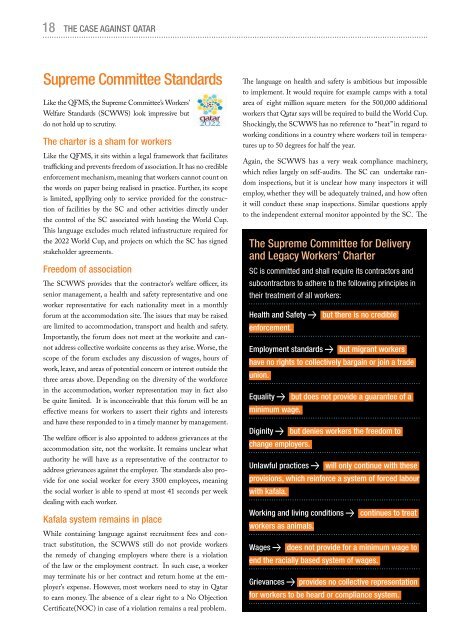11t5l
11t5l
11t5l
Create successful ePaper yourself
Turn your PDF publications into a flip-book with our unique Google optimized e-Paper software.
18 THE CASE AGAINST QATARSupreme Committee StandardsLike the QFMS, the Supreme Committee’s Workers’Welfare Standards (SCWWS) look impressive butdo not hold up to scrutiny.The charter is a sham for workersLike the QFMS, it sits within a legal framework that facilitatestrafficking and prevents freedom of association. It has no credibleenforcement mechanism, meaning that workers cannot count onthe words on paper being realised in practice. Further, its scopeis limited, appllying only to service provided for the constructionof facilities by the SC and other activities directly underthe control of the SC associated with hosting the World Cup.This language excludes much related infrastructure required forthe 2022 World Cup, and projects on which the SC has signedstakeholder agreements.Freedom of associationThe SCWWS provides that the contractor’s welfare officer, itssenior management, a health and safety representative and oneworker representative for each nationality meet in a monthlyforum at the accommodation site. The issues that may be raisedare limited to accommodation, transport and health and safety.Importantly, the forum does not meet at the worksite and cannotaddress collective worksite concerns as they arise. Worse, thescope of the forum excludes any discussion of wages, hours ofwork, leave, and areas of potential concern or interest outside thethree areas above. Depending on the diversity of the workforcein the accommodation, worker representation may in fact alsobe quite limited. It is inconceivable that this forum will be aneffective means for workers to assert their rights and interestsand have these responded to in a timely manner by management.The welfare officer is also appointed to address grievances at theaccommodation site, not the worksite. It remains unclear whatauthority he will have as a representative of the contractor toaddress grievances against the employer. The standards also providefor one social worker for every 3500 employees, meaningthe social worker is able to spend at most 41 seconds per weekdealing with each worker.Kafala system remains in placeWhile containing language against recruitment fees and contractsubstitution, the SCWWS still do not provide workersthe remedy of changing employers where there is a violationof the law or the employment contract. In such case, a workermay terminate his or her contract and return home at the employer’sexpense. However, most workers need to stay in Qatarto earn money. The absence of a clear right to a No ObjectionCertificate(NOC) in case of a violation remains a real problem.The language on health and safety is ambitious but impossibleto implement. It would require for example camps with a totalarea of eight million square meters for the 500,000 additionalworkers that Qatar says will be required to build the World Cup.Shockingly, the SCWWS has no reference to “heat” in regard toworking conditions in a country where workers toil in temperaturesup to 50 degrees for half the year.Again, the SCWWS has a very weak compliance machinery,which relies largely on self-audits. The SC can undertake randominspections, but it is unclear how many inspectors it willemploy, whether they will be adequately trained, and how oftenit will conduct these snap inspections. Similar questions applyto the independent external monitor appointed by the SC. TheThe Supreme Committee for Deliveryand Legacy Workers’ CharterSC is committed and shall require its contractors andsubcontractors to adhere to the following principles intheir treatment of all workers:Health and Safetyenforcement.but there is no credibleEmployment standards but migrant workershave no rights to collectively bargain or join a tradeunion.Equality but does not provide a guarantee of aminimum wage.Diginity but denies workers the freedom tochange employers.Unlawful practices will only continue with theseprovisions, which reinforce a system of forced labourwith kafala.Working and living conditionsworkers as animals.continues to treatWages does not provide for a minimum wage toend the racially based system of wages.Grievances provides no collective representationfor workers to be heard or compliance system.


